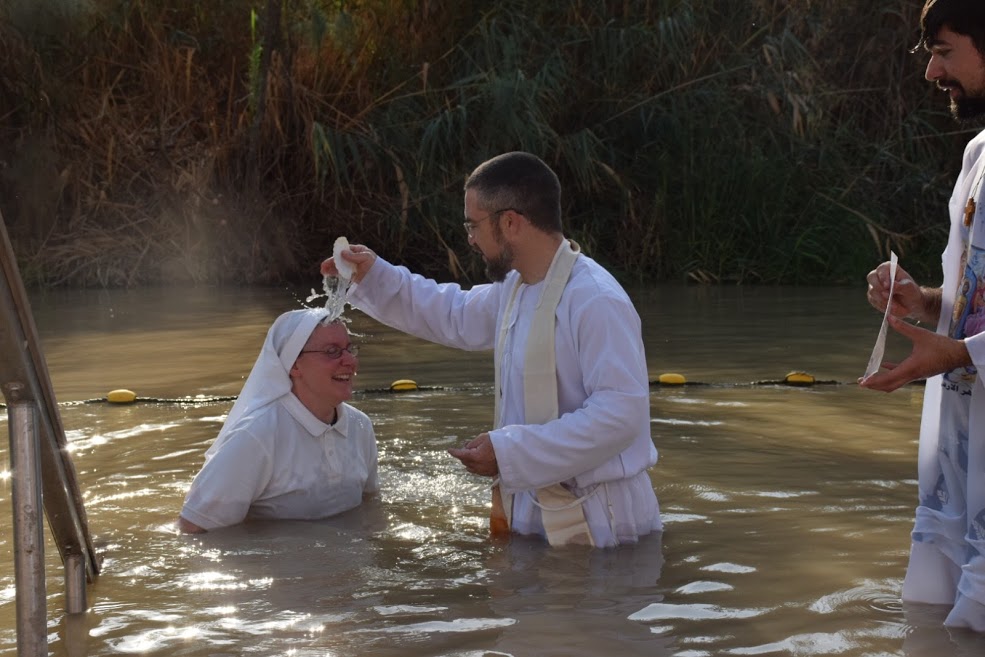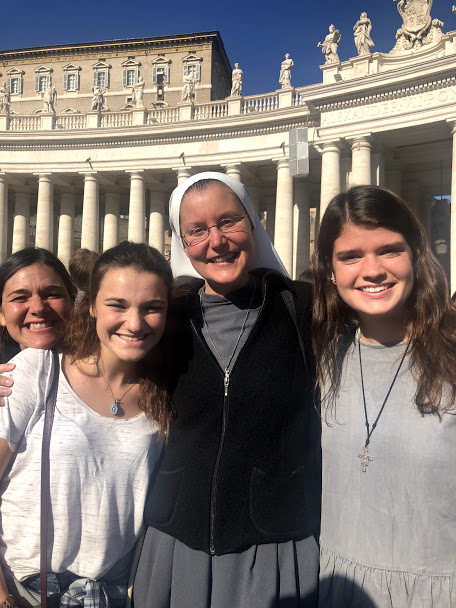Women do incredible things. This section features the stories of women who are a part of the Southeast Missouri community by way of living here, being from here or passing through. We hope these stories inspire you to connect with others and that they encourage you to be who you are in the world. We need you and your unique gifts.
Sister Elizabeth Beussink, TOR, a Jackson, Missouri, native, entered the Franciscan Sisters, Third Order Regular of Penance of the Sorrowful Mother — a group of Roman Catholic religious sisters — approximately a decade ago, a year after she graduated from Franciscan University of Steubenville in Ohio. It was a decision she says she made after she experienced in prayer the Lord asking her to be his bride.
“The Lord speaking to me in bridal terms of being his bride meant there’s a relationship, and there’s intimacy there, and there is a real, loving relationship, and it’s a relationship,” Sister Elizabeth says. “It’s not just like a duty, it’s not a career, it’s not a job. It’s a relationship, first and foremost.”
Although she says everything “fell into place” when she realized this, it was a struggle for her to get to that point. Even though growing up in Southeast Missouri she did not have a lot of exposure to religious sisters, she first experienced the desire to be a religious sister in the fifth grade. When she mentioned it to her friends, it wasn’t well-received, so she put the thought from her mind. When she was in the eighth grade, her mother took the family on pilgrimage to Medjugorje, Bosnia and Herzegovenia, where Sister Elizabeth said she opened her heart to considering the idea of religious life again.
When she started high school, however, she says she wanted to be a “normal” teenager and date boys. She recalls giving the Lord an ultimatum: prove to her that marriage wasn’t what she was called to, and she would consider becoming a religious sister. In prayer, she specified the type of boy she wanted to date, and she ended up dating a guy who matched all of those qualities. The two had a good and healthy relationship, but Sister Elizabeth felt something was missing. It was then she felt called to be the Lord’s bride. Her boyfriend broke up with her, and Sister Elizabeth recalls, laughing, “I was so excited to be broken up with. And then the rest is history.”
Now, she lives in Gaming, Austria, ministering as a campus minister to Franciscan University students who are studying abroad there. She recently went on a pilgrimage to the Holy Land with 10 students from the university. We chatted with her two days after she returned to Austria to learn about her life as a religious sister and to hear about her pilgrimage. Here, we share with you the conversation, edited for length and clarity.
What was it that drew you to the order of the Franciscan Sisters Third Order Regular of Penance of the Sorrowful Mother?
One, that we have Eucharistic Adoration twice a day, so we have two Eucharistic holy hours everyday. That really drew me, that time with the Lord. And also that we weren’t a community that was specifically one thing. So we weren’t just teachers, we weren’t just nurses, we weren’t just administrative principals or whatever. We do all the corporal and spiritual works of mercy, so we’re very open to the Holy Spirit. So we do campus ministry, we do work with the poor, we do retreat work, we give talks, we do parish missions. There’s just a wide variety of things to do, and that was really attractive to me.
What does community with your sisters look like, and what are some of the gifts and challenges of that?
If you ask a sister what’s one of the best parts of religious life, they’ll say community, and if you ask them what’s the hardest part, they’ll say community. It’s like a two-edged sword. There’s the beautiful parts of you’re living with a group of women [and] you’re all focused on the same goal. You all live the same charism, you’ve vowed your life in the same way and you love the Lord fully with your whole being, and so there’s like a momentum that’s there. And you help call each other on and you support each other in hard times and good times and you encourage each other to greater virtue, and that’s where the hard part comes in, too.
We joke that we are sandpaper for each other, too: we rub down the rough edges within our personalities. You are living with people you may have never on a natural level have ever been friends with let alone like sisters to, and so you learn different personalities and even different backgrounds. People grew up with different family dynamics and different values, and to be open to each other and loving each other where we are and giving each other the benefit of the doubt and trusting each other and at the same time calling each other to grow, it’s just a beautiful dynamic. It’s such a blessing and a challenge at the same time, but beautiful.
How do solitude and community go together?
I would like to differentiate between what solitude is, versus aloneness or isolation. Isolation and aloneness is being alone for the sake of being alone. … But solitude is with the intent you’re going away to be with the Lord, to be with the Beloved, to be fully and more present to him. I think that solitude is needed in order to live communal life well because the solitude enables you to be grounded in the Lord, be rooted in his love, be connected to him and then therefore to have self-possession and to know yourself and to be confident in his love, which frees you up for so much. You then don’t feel threatened by other people, you don’t feel like you need to one-up somebody else. You’re so comfortable in who you are because you know that you’re loved, and that solitude with the Lord is conducive to that, enables that. And so then you go into community and love your sisters and love them with the Lord’s love and see them with the Lord’s vision, and all that solitude time with the Lord flows into the communal life and enables you to live community well. I just feel like you can’t have one without the other, really.
Can you talk about being a young religious sister?
There is that misconception that nuns are only old and they’re all kind of dying out and half of them don’t wear the habit anymore, but the call is real, and it’s so alive in the young people, and I think it’s because people are just thirsting for so much more than the world offers them. And I feel like the more and more technologically advanced we get, the more advanced we get in general with life, the busier we are, the more stuff we have, the more empty they are, and so they have this hunger and this thirst. So the call is definitely out there and definitely alive in the hearts if they just have the courage and the quiet enough space to look at it.
I love being a younger religious sister because people comment on that all the time, and it just brings them so much hope, and I love being able to be that witness of hope to them — of hope in the Lord, hope in the Church and faith.
What is something you find full about your life as a religious sister?
Gosh, there’s so much. I would say first and foremost, I love my spousal relationship with the Lord, and I love how fully I can live my femininity as a religious sister in all dimensions in the whole feminine genius gamut, especially in my motherhood. So I love being a spiritual mother, and I love that my love between me and the Lord is fruitful, and I can see it in my ministry. And I can see it in my prayer, interceding for the world.
Working in campus ministry, it’s a particular feeling of being full because I get to see my spiritual children in front of me. I’m a spiritual director here for some of the students, and getting to journey and walk with some of the students and help them to hear the Lord and to see them grow and to watch them fall in love with the Lord is just so incredible. I just go to bed so grateful every night for the gift to witness that firsthand. It’s such a grace.
How were you drawn to campus ministry?
How I got here is that lovely vow of obedience. I am assigned here. So we get assigned by our superiors to go to different houses, do different ministries, things like that. And we dialogue with our superiors, so it’s not so much like out of the blue, all of the sudden you’re just told what you’re doing. They know your gifts, they know what you’re interested in, they know what you would like to do. They ask your opinion. Ultimately, they have the final say, and it depends on the needs of the community and how the Holy Spirit leads, but generally, it’s dialogue there [and then] they just assign us where we go.
Your order wears a habit. Can you talk about that?
Wearing the habit was one of the things that attracted me to the community. Our habit, it’s a gray habit with a white veil. The gray symbolizes for us a life of penance; which, penance is not like flogging yourself with rocks and sticks. Penance means “ongoing conversion,” and that’s a charism of the Franciscan order as a whole. So you sacrifice things, but not as an end in themselves. It’s always to empty yourself out more to receive more of the Lord, so you’re decluttering. So like, living a life of penance means that we’re constantly decluttering ourselves from our attachments to different worldly things or whatever so that we can receive more of the Lord and be able to give more of the Lord to others.
So that’s why we wear the gray, and the white veils symbolizes our bridal stance, how we are brides of Christ. Oh, we also wear a white chord. That’s typical of Franciscans, with three knots, symbolizing the three vows of poverty, chastity and obedience.
Wearing the habit represents, one, that I’m set apart for the Lord, but that it’s not just me that’s set apart, that this love relationship that I have — this spousal relationship that I have with the Lord — is intended for every soul. So I witness to that, that there’s something more to this world than what we’re living. There’s a heavenly world, there’s a heavenly marriage. Jesus is a God that’s passionately in love with you, that wants to marry you and be in an intimate relationship with you. And I symbolize that love that surpasses all levels you could ever imagine by what I wear.
What is one reflection you are bringing back with you from your pilgrimage to the Holy Land?
I really felt like Jesus as my spouse was taking me to his homeland. … I just felt like he was so excited to show me his homeland, a place that he loved, a place that was so much a part of his life, and for me to get to experience that with him was just very special. Just so many moments where I felt like I could almost tangibly experience his excitement and his joy that I was there with him in getting to see and experience these places that meant so much to him, too. So I guess him just being so much more real and uncovering another layer of him in my relationship.
What was it like getting to experience that with your students?
I was available for anyone seeking spiritual direction, and situations like this when you’re with students for 10 days, we were literally camping together, and so you just get really close to each other, and so you feel really comfortable. So they were asking a lot of questions, personal questions, deep questions, and so to be able to be there to answer and to help lead and guide and to help unpack what the Lord was doing and just again being in the front row of watching the Lord’s grace working in somebody is just awesome. So for me personally, it was incredible to get to be with the students as they’re experiencing these powerful places.
How would you define a pilgrimage?
I would describe a pilgrimage as a journey, and I would describe it as an interior journey. So back in the day before there were cars and bikes, people would take pilgrimages on foot, and it was usually to a holy site or a holy place, and it was for a special intention or for their own salvation of their soul, but it wasn’t about the distance you traveled, it was more about the depth, the interior depth, the interior distance you traveled. So it was about transformation of your heart, and so that’s what I would say is key to pilgrimage: it’s about your interior transformation on the journey.



